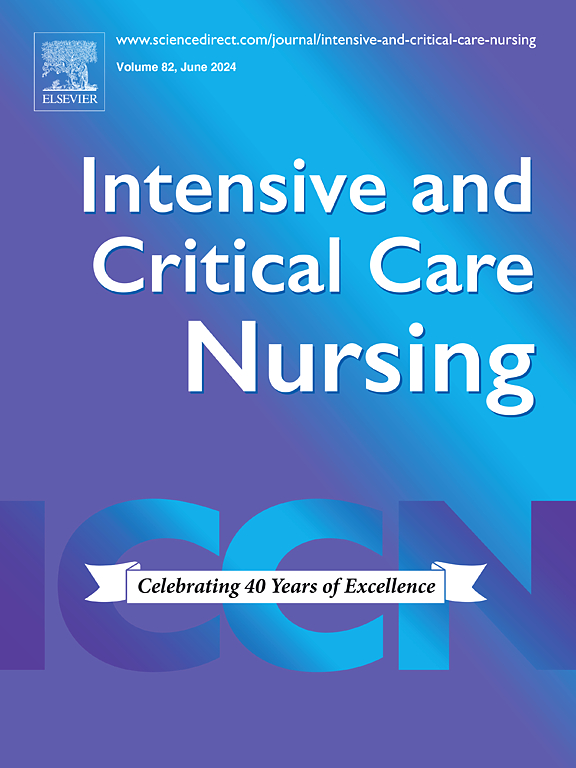儿科重症监护室护士在护理受到虐待的儿童和青少年时遇到的挑战:定性现象学研究
IF 4.9
2区 医学
Q1 NURSING
引用次数: 0
摘要
研究目的:本研究探讨儿科重症监护室(PICU)护士在护理受虐待儿科病人时所面临的挑战和经验。研究方法/设计:在 2022 年 2 月至 5 月期间,采用面对面半结构化访谈的方式进行了一项定性研究。研究背景:通过目的性抽样和滚雪球抽样,从台湾大学附属儿童医院招募了 20 名 PICU 护士。结果确定了十个次主题,并将其归纳为三个主要主题:不稳定的护患关系",强调了护士与受虐待儿童和青少年家属之间的紧张关系和沟通挑战;"处理儿童虐待的相关能力不足",指出护士缺乏处理儿童虐待问题的敏感性、经验和必要技能;以及 "多学科团队合作的挑战",强调了护士的不知所措感,以及对不同专业团队参与护理的连续性的担忧。结论PICU 护士在护理受虐待儿童和青少年时面临着巨大的压力。这可归因于不稳定的护患关系、护士护理相关能力不足以及多学科团队干预带来的复杂性。因此,优先采取的行动包括持续的在职教育、分享相关的专业经验、提高护士对虐待问题的敏感性、建立标准操作程序、针对 PICU 护士的需求开发全面的个案管理系统和多学科专业知识。这些干预措施旨在提高护士的能力,促进共同努力,提供优质的医疗护理服务。本文章由计算机程序翻译,如有差异,请以英文原文为准。
Challenges perceived by pediatric intensive care unit nurses in caring for maltreated children and adolescents: A qualitative phenomenological study
Objectives
This study explores the challenges and experiences faced by paediatric intensive care unit (PICU) nurses while caring for maltreated paediatric patients. Research Methodology/Design: A qualitative study was conducted using face-to-face semi-structured interviews from February to May 2022. The data were transcribed verbatim and a simple thematic analysis was used.
Setting
Twenty PICU nurses from National Taiwan University Children’s Hospital were recruited through purposive and snowball sampling.
Findings
Ten sub-themes were identified and synthesised into three primary themes: ‘unstable nurse-patient relationships’, highlighting the tensions and communication challenges between nurses, and the families of maltreated children and adolescents; ‘insufficient pertinent competencies in handling child maltreatment’, pointing to nurses’ lack of sensitivity, experience, and requisite skills for addressing child maltreatment; and ‘challenges in multidisciplinary team collaboration’, which underscores nurses’ feelings of being overwhelmed and apprehensions regarding the continuity of care as various professional teams are involved.
Conclusion
PICU nurses face considerable stress while caring for maltreated children and adolescents. This can be attributed to unstable nurse-patient relationships, insufficient care-related competencies of nurses, and the complexities introduced by multidisciplinary team interventions. Therefore, priority actions include continuous in-service education, sharing pertinent professional experiences, enhancing nurses’ sensitivity toward maltreatment, establishing standard operating procedures, and developing comprehensive case management systems and multidisciplinary expertise tailored to the needs of PICU nurses.
Implications for clinical practice
Understanding the stressors and challenges encountered by PICU nurses in caring for maltreated children and adolescents can guide the design and implementation of interventions by current hospital decision-making bodies or child protection medical centres to enhance the clinical working environment. These interventions can aim to bolster the competencies of nurses and promote joint efforts in delivering superior medical care.
求助全文
通过发布文献求助,成功后即可免费获取论文全文。
去求助
来源期刊

Intensive and Critical Care Nursing
NURSING-
CiteScore
6.30
自引率
15.10%
发文量
144
审稿时长
57 days
期刊介绍:
The aims of Intensive and Critical Care Nursing are to promote excellence of care of critically ill patients by specialist nurses and their professional colleagues; to provide an international and interdisciplinary forum for the publication, dissemination and exchange of research findings, experience and ideas; to develop and enhance the knowledge, skills, attitudes and creative thinking essential to good critical care nursing practice. The journal publishes reviews, updates and feature articles in addition to original papers and significant preliminary communications. Articles may deal with any part of practice including relevant clinical, research, educational, psychological and technological aspects.
 求助内容:
求助内容: 应助结果提醒方式:
应助结果提醒方式:


